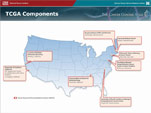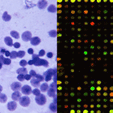I Cancer Genome Characterization Centers

Click here to view a map of the Cancer Genome Characterization Centers (CGCCs).

Click here to learn more about new funding for CGCCs.
The Cancer Genome Characterization Centers (CGCCs) support The Cancer Genome Atlas (TCGA) in accelerating the understanding of the molecular basis of cancer. The TCGA CGCCs work as a network. Each center uses advanced and complementary analysis technologies to strategically characterize genomic changes involved in the three types of cancers selected for TCGA: brain (glioblastoma multiforme), lung (squamous cell), and ovarian serous cancer. Genomic changes being studied include deletions, rearrangements, and amplification of large chromosomal segments.
TCGA CGCCs are investigating changes of the transcriptome found in the three selected cancers, and one center is developing a pipeline to characterize the methylation changes. The CGCCs are also identifying potential genomic regions for sequencing by the Genome Sequencing Centers. Biomolecules for CGCC analysis are extracted by the Biospecimen Core Resource and provided to the Centers.
Data from the CGCCs is highly annotated, archived, and processed through a cancer Biomedical Informatics Grid® (caBIG®)-compatible portal. The data is periodically evaluated to prioritize selections of candidate gene regions for targeted genomic sequencing. All data produced by the CGCCs is publicly available through the TCGA Data Portal, with respect to patient privacy and confidentiality.
Each CGCC supports technology development and implementation efforts to enhance throughput rates and decrease costs. Each also increase the sensitivity and specificity of the chosen technologies to ensure that capabilities and efficiencies are enhanced to achieve future cancer characterization objectives. One CGCC is investigating new technology that can identify the transcriptome changes through sequencing as an alternative to microarray approaches. Another CGCC is exploring technology that can identify translocations on micro-array platforms as an alternative to cytogenetic based approaches.
In 2006, the NCI awarded a total of $11.7 million per year to support the CGCCs. The institutions receiving CGCC awards include:
- Broad Institute of MIT and Harvard, Cambridge, Mass.
Using the Affymetrix platform, this center will identify changes in expression and copy number alterations that occur in cancer.
- Harvard Medical School and Brigham and Women's Hospital, Boston, Mass.
Using the Agilent platform, this center will characterize tumor samples for alterations in chromosome segments copy number. This center will also develop new technologies to analyze expression profiles.
- Lawrence Berkeley National Laboratory, Berkeley, Calif.
Using an Affymetrix Exon 1.0 array platform, this center will identify changes in the transcription profiles that occur in cancer.
- Memorial Sloan-Kettering Cancer Center, New York, N.Y.
Using Agilent arrays, this center will provide characterization of chromosome segment gains and losses. This center will also develop new approaches to detect novel genetic rearrangements.
- The Sidney Kimmel Comprehensive Cancer Center at Johns Hopkins University, Baltimore, Md.
This is a joint project with the University of Southern California/Norris Comprehensive Cancer Center, which will use Illumina’s GoldenGate® Genotyping platform, to detect changes in methylation profiles associated with transcribed genes in cancer samples.
- HudsonAlpha Institute for Biotechnology, Huntsville, Ala.
Using Illumina’s HumanHap550 Genotyping BeadChip, this project will identify chromosome segments copy number variation found in cancer.
- University of North Carolina Lineberger Comprehensive Cancer Center, Chapel Hill, N.C.
Using an Agilent array platform, this center will identify changes in the transcription profiles that occur in cancer.
| 